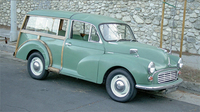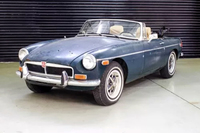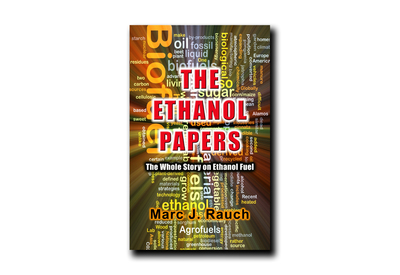UK's Department for Transport Uses Boogeyman Allusions to Sidetrack E10 Adoption
By Marc J. Rauch
Exec. Vice President/Co-Publisher
THE AUTO CHANNEL
 Marc J. Rauch |
Henny Hemmes, The Auto Channel's Senior European Editor, tipped me off to a story that appeared a couple of days ago on the website for Auto Express magazine. Auto Express is a very well known British publication that is about the same age as The Auto Channel. The story is titled "New E10 Petrol Plans: 800,000 Cars Would Be Incompatible." For those who don't know, petrol is the British word for gasoline. (And if you don't know, Henny Hemmes is one of the most successful Dutch race car drivers from the seventies to the present. She was the first female driver to win a Dutch FIA Championship, and has been a test driver and automotive writer for more than 30 years.)
The Auto Express story talks about the UK's plans to raise standard gasoline from E5 to E10, and how the increase from about 5% ethanol-gasoline blend to about 10% ethanol-gasoline blend would be incompatible with around 800,000 cars currently on the road throughout the UK - according to the government (the UK government).
The Auto Express article lists five different examples of cars that are claimed to be incompatible with E10. These examples are part of what the story says is "fresh research" from the RAC Foundation (RAC
Foundation had been part of Royal Automobile Club Motoring Services, which was equivalent to America's AAA). The five examples are:
-
Volkswagen Golf
MG MGB
Mazda MX-5
Nissan Micra
Morris Minor
The article doesn't give the model years that these "incompatible" vehicles would be, so I presume it's just a blanket statement of incompatibility.
Well, the list instantly made me laugh. Three of the vehicles are sold in America and/or Brazil - the Golf, the MX-5 (also known as Miata), and the Micra. In the U.S., our standard gasoline is E10. In Brazil, their standard gasolina is E27. So if the Golf and the MX-5 can run on E10 in America, and all three can run on E27 in Brazil, why would they be unable to run on E10 in the UK?
Answer: They're perfectly capable of running on E10 in England, Scotland, Wales, and Northern Ireland. What the article should say, but doesn't, is that it's not a situation of the vehicles being "unable" to run on E10, but a situation in which the manufacturers have chosen to try and limit their warranty-liability by claiming that no fuel above E5 should be used - this is a far cry from being-able to-run and not-able-to-run.
The other two vehicles are old vehicles, they're classics, of a sort. Morris Minors were built between 1948 and 1971, and MG manufactured MGBs from 1962 to about 1980. Here's the thing, from the 1920's to the 1970's at least two gasoline companies in Great Britain marketed ethanol-gasoline blends of E10 to E30. One of the gasoline companies was owned by Standard Oil (Esso), another by Cities Service. These were and are major oil companies. Consequently, both the Morris Minor and the MG MGB were manufactured to run on "power alcohol" fuels (power alcohol is what they called ethanol-gasoline blends). I tried doing an Internet search for any literature from those early days to see if the respective manufacturers restricted their vehicles from using power alcohol fuels, but I couldn't find any (if any reader has such documentation, please send me a copy). The big question, then, is if the Minor and the MGB were able to run on E10 to E30 when they were built, why would they be unable to run on E10 now?
 1967 Morris Minor for sale in Los Angeles |
 1967 MG MGB for sale in Brazil |
I think I've made my point; time to move on.
The Auto Express article states, "The higher bioethanol content of E10 can dislodge deposits in older engines and fuel systems, causing blockages. It can also cause some seals, gaskets, metals and plastics to corrode in unsuitable vehicles."
Deposits? What kind of deposits? Oh, you mean like the built-up gunk that forms from burnt gasoline! The deposits don't come from ethanol, because ethanol burns very, very clean. They come from GASOLINE...PETROL. In other words, the ethanol acts like a cleaner and gets rid of deposits caused by gasoline. Why is that a bad thing?!
You know, it is true that if someone has been using ethanol-free gasoline in their vehicle for many years, and then suddenly introduced a high blend level of ethanol-gasoline to their car's engine that some of those cruddy, crappy, gooey deposits could come loose and gum-up the works. And at this point some maintenance and new parts might be necessary. However, if this is the situation, then their vehicle would require the same work at some point even if they continued using ethanol-free gasoline, just as has been the case for the entire history of the motorcar (automobile). Engine repairmen and facilities are not a new thing; they didn't suddenly crop-up when the Renewable Fuel Standard was enacted.
But, if the vehicles have been using E5 for some time, then there's the likelihood that the small amount of ethanol in the E5 petrol has already been slowly cleaning the engine. Therefore, by making the small move from E5 to E10, there shouldn't be any drastic avalanche of gunk to create a blockage. Instead, the car owner is getting what amounts to a free engine cleaning and crud prevention service. Incidentally, when Brazil was contemplating the move from mandated E25 to E27 the boo-birds came out once again with the same fear-mongering rhetoric that the jump from 25% ethanol to 27% ethanol would somehow be that tipping point at which automobile engines might crumble to dust. They did tests and found nothing to conclude that E27 would be any different than E25, or for that matter E20, E15, or E10.
Now I know that it's hard to believe anything that comes from people who speak a language other than English (I am being sarcastic), but sometimes it's good to look past your moral superiority of being an English-speaker, and consider that the information could be true.
As for ethanol being the sole or primary cause of corrosion to some seals, gaskets, metals and plastics, like what? Which seals, gaskets, metals and plastics? In my review of compatibility websites that compare different substances and their compatibility with various materials, I think it's glaringly obvious that ethanol is far more compatible with more materials likely to be used in automobiles than either gasoline or the aromatics often contained in gasoline as a replacement for ethanol as an oxygenate (such as toluene, benzene, and Xylene). If you're keen to see the comparisons for yourself, check out these web resources:
https://www.customadvanced.com/printable-chemical-resistance-chart.html
https://www.calpaclab.com/aluminum-chemical-compatibility-chart/
http://www.plasticsintl.com/plastics_chemical_resistence_chart.html
So I wrote an email to Hugo Griffiths, author of the Auto Express story (and copied a couple of the editors at the same publication), and in my usual charming bedside manner, I told him that his story was nonsense. Of course, after I sent the email I was immediately remorseful...not because of my harsh condemnation, but because I should have used the word "rubbish" instead of "nonsense" - rubbish seems to be a better British way to say nonsense according to all the wonderful British TV shows that I binge-watch.
In any event, I received back a short but very nice and polite email from Hugo. He wrote,
"Hi Marc - Thanks for getting in touch.
"I appreciate your points, and this is clearly an issue on which opinions are divided.
"It's not just the RAC Foundation that considers a large number of cars are incompatible with E10, though. The UK Government estimates there are around million cars on the road 'for which the manufacturer has not approved the vehicle for use with E10'."
Hugo then included a website link to a recent report issued by the UK Department for Transport. That report can be found by CLICKING HERE.
I read the report.
The report doesn't actually state that ethanol is damaging, or how it can cause damage, or which vehicles it is incompatible with. It only makes reference to concerns that have been voiced about ethanol. In other words, the report merely alludes to an ethanol-boogeyman in the same way that adults use an allegorical boogeyman to frighten children into good behaviour (please note my British spelling of the word "behavior" - I did this in the interest of continuing warm relations with our cousins on the other side of the pond).
I replied to Hugo and wrote:
"I understand that there is great division of thought on this issue. Oil industry money has created this division and kept it alive.
"However, the facts are that no gasoline-powered vehicles are damaged because of ethanol-gasoline blends - not in the 60 years that ethanol-gasoline blends were extensively marketed in Great Britain between the 1920's to the 1970's, not in France or Germany or Sweden or any other European country, not in Brazil for the past 50+ years, and not even in Brazil in the years since they've mandated E25 and then E27.
"The RAC Foundation, like the AAA, has probably received significant remuneration from the oil industry and so they are happy to go along with the rubbish.
"Ethanol does not damage engines, it cleans engines. This isn't to say that internal combustion engines that run on ethanol-gasoline blends don't experience deterioration over time owing to wear and tear and the general nature of the fact that there are moving parts, and that fuel is exploding and combusting within its walls. But to blame ethanol for this, as if gasoline (petrol) is not the primary cause of the problems is ludicrous.
"Ethanol has been blamed for corrosion to rubber, plastic and aluminum; however it is gasoline that is corrosive to those substances. It is gasoline that required the invention of a new rubber (Viton) many years ago to stop corrosion, not ethanol. And any metallic substance that can experience rust problems because of ethanol will experience the same results from gasoline.
"I read through the UK Department for Transport document via the link you sent. It is incorrect and it ignores the history of Great Britain's use of ethanol-gasoline blends from Cleveland Discol and Cities Service for many decades. The Dept. for Transport's document should have started off by reminding any reader that ethanol-gasoline blends have a long and successful history of use in Great Britain. And the report should conclude with a statement like: 'E10 to E30 blends provided us with a cleaner, safer, more powerful, and less expensive fuel for more than half a century. There's no reason to think it won't do the same now.'
"I'll be sending an email to the Department of Transport about this..."
As I stated at the beginning of this editorial, the Auto Express article is a good example of how bad information gets passed along about ethanol, and how it can propagate more insidious bad information. At the bottom of the webpage that hosts the AE story are comments from readers. Other than my comments about the story, there are several comments from other readers who use the allusions of the AE article to tee-off on ethanol with additional illusionary negative comments about ethanol, such as:
"There are hundreds of 1,000's of classic cars from all eras that would suffer from this fuel; you only have to read the comments on any number of Facebook group pages to read the havoc it's causing in the USA to know it'll do huge harm to classic cars."
In point of fact, although there does seem to be "any number of Facebook group pages" that claim ethanol is causing problems, the havoc is caused not by ethanol itself, but by the routine empty, ignorant lies and exaggerations about the ethanol-boogeyman that were invented and promulgated by the petroleum oil industry long ago
The final result is that we're left with an Auto Express story that only alludes to problems caused by ethanol, and instead of specific examples to prove the problems they rely on "fresh research" provided by RAC Foundation that offers no specific examples of how or why damage from ethanol is caused. Auto Express then backs up all the rumors of ethanol damage with a UK government report that simply refers to unspecified concerns that ethanol can cause problems. And, we get to read a vacuous comment left by an unknown reader that there are Facebook pages in the U.S. that claim ethanol is harmful to classic cars.
Meanwhile, because of this chain of bad information, you know that there will be people running around blabbering that hundreds of thousands of otherwise perfectly good cars will just not operate on any gasoline that contains 10% or more ethanol.
The Auto Express story is nonsense. The information supplied by RAC Foundation is rubbish. The report by the UK Department for Transport is worthless. If you think my take on all this is wrong then read my editorial "The Hypocrisy of Big Oil and API" and try to explain why for almost 60 years British petrol companies and automobile publications screamed that ethanol-gasoline blends were cleaner, safer, more powerful, produced better mileage, and less expensive than ethanol-free gasoline.
SEE ALSO:
• AAA Blunder on Ethanol Sets Off Firestorm of Criticism
• Why Does AAA and Big Oil Feel They Must Lie to America?
• AAA Gets It Wrong On Ethanol Again
• Every Spark-Ignited Internal Combustion Engine Ever Produced Has Been Damaged By Gasoline
 |



